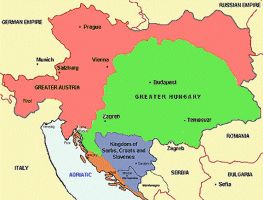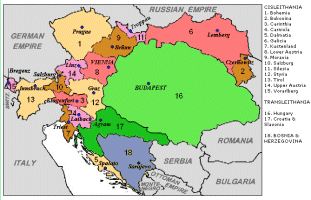Austro-Hungarian Nationalities
| Lower Austria | Austria | 1282 | 1918 |
| Upper Austria | Austria | 1282 | 1918 |
| Styria | Austria | 1282 | 1918 |
| Vorarlberg | Austria | 1282 | 1918 |
| Carniola | Slovenia | 1282 | 1918 |
| Carinthia | Austria | 1335 | 1918 |
| Hungary | Hungary | 1526 | 1918 |
| Upper Hungary | Slovakia | 1526 | 1918 |
| Croatia | Croatia | 1526 | 1918 |
| Moravia | Czech Republic | 1526 | 1918 |
| Bohemia | Czech Republic | 1526 | 1918 |
| Silesia | Poland | 1526 | 1918 |
| Transylvania | Romania | 1699 | 1918 |
| Hungary | Hungary | 1699 | 1918 |
| Netherlands | Netherlands | 1712 | 1797 |
| Lombardy | Italy | 1714 | 1859 |
| Servia | Serbia | 1716 | 1739 |
| Craiova | Romania | 1718 | 1739 |
| Temesvar | Romania | 1718 | 1918 |
| Trieste | Croatia | 1727 | 1918 |
| Tuscany | Italy | 1737 | 1860 |
| Galicia | Ukraine | 1722 | 1918 |
| Bukovina | Ukraine / Romania | 1777 | 1918 |
| Salzburg | Austria | 1808 | 1816 |
| Trentino / Tirol | Italy | 1813 | 1918 |
| Modena | Italy | 1814 | 1839 |
| Dalmatia | Croatia | 1818 | 1918 |
| Bosnia | Bosnia | 1876 | 1918 |
| Venetia | Italy | 1814 | 1866 |
No matter what names the Parliament parties had on their banners, their real aspirations were outside of an Austro-Hungarian State of whatever form. The Czechs wanted the reŽstablishment of the kingdom of Bohemia, and finally the union with Russia, The Routhenians, oppressed by the Poles and differing in language and religion from them, looked longingly forward to an incorporation into the empire of the czar. The Poles proclaimed secretly, if not openly, the restoration of the kingdom of Poland. Italia irredenta was ever alive in the Trentina and Trieste, no matter how hard the Slavs, officials, and gendarmes tried to suppress it. The southern Slavs of the coastlands, Dalmatia, Croatia, and Slavonia clamored for a unification, and their ultimate aim was the reestablishment of the old Servian kingdom, embracing also Servia. Bosnia, Herzegovina, and Montenegro. The Roumanians wished their annexation by the co-national young and vigorous kingdom. And lastly, not least, the Germans of Bohemia, Moravia, Silesia, Lower Austria, Styria, and the most advanced and politically educated inhabitants of the Alps, desired a union of the German provinces with Germany in some shape or form.
In past times, when Austria had held France tight bound between Spain, Germany, and the Netherlands, she had aspired to a dominant position in Western Europe; and, so long as her eyes were turned in that direction, she naturally had every interest in preserving the Ottoman Empire intact, for she was thus guaranteed against all attacks from the south. But, after the loss oi her Italian possessions in 1805, and of part of Croatia in 1800. after the disasters of 1840, 1850 and 1866, she thought more and more seriously of indemnifying herself at the expense of Turkey. It was moreover evident that, in order to paralyze the damaging power of Hungary, it was essential for her to assimilate the primitive and scattered peoples of Turkey, accustomed to centuries of complete submission and obedience, and form thus a kind of iron band which should encircle Hungary and effectually prevent her from rising. Austria, by the very' instinct of self-preservation, was forced to turn eastwards and to consider how best she might devour some, at least, of the European provinces of Turkey.
Bohemia, Moravia, and Silesia had a population mixed of Czechs and Germans, the percentage in Bohemia being about 5 to 3, the Czechs living chiefly in the center of the province, the Germans occupying the districts of the northwestern and northeastern frontier. The Czechs wished to bring about the reŽstablishment of the former Bohemian kingdom and a position in the empire similar to Hungary. The Germans in Bohemia desired a detachment of their districts and a separate administration for this territory, because they claimed to be oppressed by the Czech majority of the Bohemian Diet in matters of administration and public education.
The taxes, coming principally from the rich industrial and agricultural districts of Bohemia, Moravia, Silesia, Lower Austria, and Styria, were spent largely on the hopelessly bankrupt province of Galicia and for the development of Magyar industries, and wasted on a lot of red-tape and translations necessary to humor the different little nations.
The two halves of the monarchy were diametrically opposed to each other in their whole internal and foreign policy. The majority of the Austrian Parliament was Panslavist, autonomist, reactionary; the majority of the Hungarian, Slavophobe, centralist, and liberal. The first was openly opposed to the continuation of the Triple Alliance, the latter was a stout adherent to it. No matter how earnestly the rulers of Germany, Austria, and Italy proclaimed at every occasion that the Triple Alliance stood as strongly as ever, the hatred of the Austrian Slavs for Germany and the contempt which the Roman Catholic party entertained for Italy made this alliance a mere piece of paper.
In Austria, German Nationalism became ever more passionate and bitter. The Germans of Austria found themselves confronted by a considerable Slav majority, beyond the restraining influence of the Germans of the Empire. Besides, through the introduction of the dual monarchy, they had lost no little influence themselves. Under the single monarchy, the leadership used to be more or less in the hands of German, or at least, of German-speaking officials ; but now they had lost Hungary, with Transylvania and Croatia, and also Galicia, where a separate Polish-speaking administration was established. Even on this side the Leitha the non-German races no longer acquiesced peaceably in German rule. The Czechs in Bohemia and Moravia, and the Slovenes in the southern mountain-districts revolted against it, and demanded the equalisation, in all public offices, of the Czech and Slovene languages - with German, hitherto the only official language. It was evident that the immediate result of these conflicting efforts would be a Babel of tongues, with the disintegration of Austria as the remoter issue, since in this polyglot country only one language could have absolute supremacy, and that language must be German.
During the three last decades of the 19th Century the incessant conflicts, to which these national aspirations gave rise, gradually increased in violence and significance. The scale inclined, now to the Germans, now to the Slavs, according to whichever party happened to be in power; but on the whole it favoured the Slavs, who had many powerful confederates among the higher aristocracy and clergy. Both sides, especially the German, became more and more embittered. Some members of the great German Liberal party, which represented Nationalism in Parliament, voted for a more decided attitude upon the national question, and broke with their colleagues, forming a section of their own that called itself the 'German Club.' They invented a certain style of parliamentary debate, known as the 'scharfere Tonart,' which attracted attention by its excessive violence.
The political fragility of the Dual Monarchy is well illustrated by Count Tisza, Hungarian Prime Minister from 1913 to 1917. He did not consider questions from the standpoint of the entire Monarchy, but rather from that of the Magyar center. Tisza ignored the interests of the rest of the Empire, like all other Hungarians. He did not deny it. He often said he knew no patriotism save the Hungarian, but that it was in the interests of Hungary to keep together with Austria; therefore he saw most things with a crooked vision. Never would he have ceded one single square meter of Hungarian territory; but he raised no objection to the projected cession of Galicia. He would rather have let the whole world be ruined than give up Transylvania; but he took no interest whatever in the Tyrol. He opposed any expansion of the Monarchy, as it might weaken Hungary's influence. He looked upon it as out of the question to grant the Serbians access to the sea, because he wanted the Serbian agricultural products when he was in need of them; nor would he leave an open door for the Serbian pigs, as he did not wish the price of the Hungarian to be lowered. The Magyar-Central standpoint was not a specialty of Tisza's; all Magyar politicians upheld it. Tisza had one great point in his favor; he had no wish to prolong the war for the purpose of conquest.
|
NEWSLETTER
|
| Join the GlobalSecurity.org mailing list |
|
|
|



